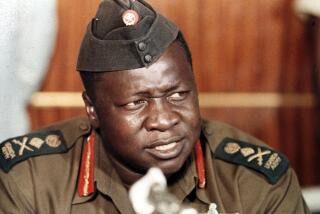Milton Obote, 80; Prime Minister, President of Uganda Led Regimes Known for Corruption, Brutality
- Share via
Milton Obote, Uganda’s first prime minister after independence, who led regimes known for corruption and brutality, died Monday in South Africa. He was 80.
Obote, who was overthrown by the equally repressive Idi Amin and eventually returned to power after Amin in turn was ousted, had been living in exile in Zambia.
Henry Mayega, secretary-general of Obote’s Ugandan People’s Congress, said the former president and prime minister had been in failing health for some time.
The BBC reported that Obote died of kidney failure at a hospital in Johannesburg.
The son of a chief and farmer in the Lango tribal area of northern Uganda, Obote began his education in 1940 at a Protestant Missionary School. He went on to secondary school and graduated from Makerere College.
With jobs scarce for members of his tribe, Obote left Uganda for Kenya and found work in an engineering firm and for several industrial concerns.
He also became involved in the local independence movement and was an early member of the Kenya African Union.
Obote returned to Uganda in 1956 and entered politics.
Two years later, he was appointed to the country’s Legislative Council, and he retained the seat in the country’s first direct elections.
When the Uganda National Congress party split in 1959, Obote became head of the newly formed Uganda People’s Congress.
He eventually formed a coalition with the country’s Buganda royalist party, Kabaka Yekka.
Obote was elected prime minister in 1961 and presided over the British withdrawal in October 1962.
He staged a coup in 1966 against the rule of King Mutesa II, suspended the constitution and declared himself president.
Anger over Obote’s decision to disband Uganda’s four traditional monarchies and to institute a socialist system caused his popularity to plummet. He relied on arbitrary detentions and extrajudicial executions to maintain power.
While Obote was at a summit in Singapore in 1971, his once-trusted aide, Amin, seized control of the country.
Obote sought refuge in Tanzania, where he was protected by his friend, then-President Julius Nyerere, whose soldiers later helped Ugandan rebels overthrow Amin in April 1979. Obote returned to power the following year, but his rule was marked by repression.
Uganda’s current president, Yoweri Museveni, raised an army and fought a civil war against Obote from 1980 to 1985. Obote was ousted for a second time in a 1985 coup, and Museveni took control.
Museveni’s government estimates more than 500,000 civilians died in the early 1980s from Obote’s policies of forcing residents out of rural areas and into cities.
In 1999, Museveni said he would not stop Obote from returning to Uganda, but neither would he stop Obote from being charged with crimes against humanity if he did.
James Rwanyarare, a senior People’s Congress official and a longtime friend of Obote, said the country had lost one of its founding fathers.
“This man built our nation, and he has been keeping us together since independence in 1962,” he said.
Rwanyarare’s feelings were not shared by everyone in Uganda, where Obote’s control of the Ugandan People’s Congress from exile was often used as a specter to discourage support for multiparty politics.
“That man is better dead; he killed many people,” said George Ssali, a Kampala resident. “The nation should not remember him. It is a good riddance.”
Information on Obote’s survivors was not immediately available.
More to Read
Sign up for Essential California
The most important California stories and recommendations in your inbox every morning.
You may occasionally receive promotional content from the Los Angeles Times.













